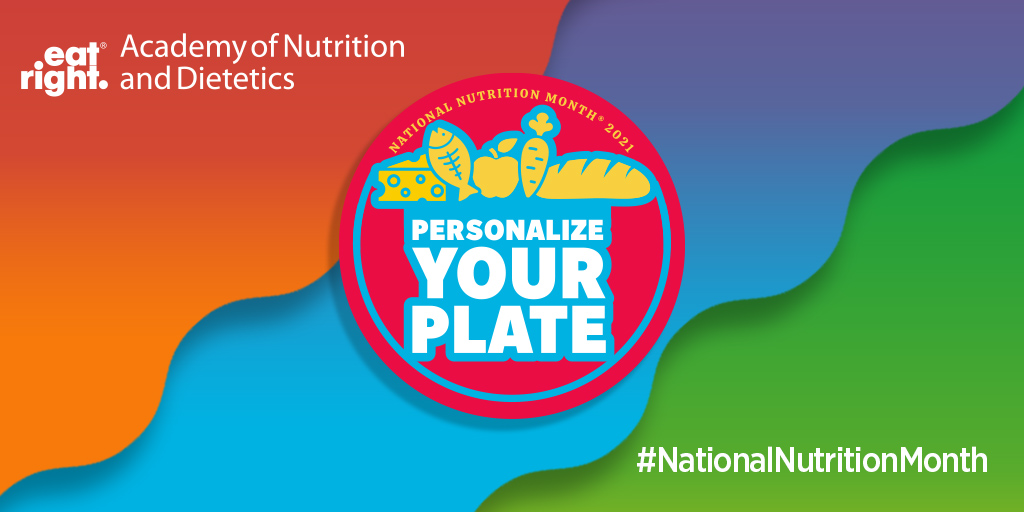National Nutrition Month recognized in March

Developing a healthful eating pattern is not a one-size-fits all endeavor. The key is tailoring your favorite foods to meet your individual nutrient needs.
This March, the Georgia Department of Public Health’s South Health District joins the Academy of Nutrition and Dietetics to recognize National Nutrition Month and focus on the theme of “Personalize Your Plate.”
Personalize Your Plate promotes creating nutritious meals to meet individuals’ cultural and personal food preferences.
“Food choices are so personal for everyone,” said Holly Rountree, Nutrition Services Director with South Health District. “Eating should be something that you enjoy and being told that you must eat certain foods to be healthy is not sustainable for a healthy diet. If you are told that you can’t use seasonings or that you can’t eat a food you really enjoy, that is not a healthy eating plan that you will stick to for long.”
During National Nutrition Month, South Health District encourages everyone to make informed food choices and develop sound eating and physical activity habits they can follow all year long.
“If you are a person who enjoys different flavors and food experiences, then create a plate that reflects that,” Rountree said. Spice up your menus with the foods and flavors you enjoy and add new flavors to spark excitement in your cooking. “Just because you want to eat healthy does not mean that baked chicken and broccoli are all you should eat. There are tons of foods that you can include in your meal plan that can help you lead a healthy life while still enjoying the food you eat. That is how you create a sustainable healthy eating plan.”
The Academy of Nutrition and Dietetics also offers 20 tips for a healthier life:
- Eat Breakfast – Start your day with a healthy breakfast that includes lean protein, whole grains, fruits and vegetables.
- Make Half Your Plate Fruits and Vegetables – Fruits and veggies add color, flavor and texture plus vitamins, minerals and dietary fiber to your plate.
- Watch Portion Sizes – Use half your plate for fruits and vegetables and the other half for grains and lean protein foods.
- Be Active – Regular physical activity has many health benefits.
- Get to Know Food Labels – Reading the Nutrition Facts panel can help you choose foods and drinks to meet your nutrient needs.
- Fix Healthy Snacks – Healthy snacks can sustain your energy levels between meals, especially when they include a combination of foods.
- Consult a Registered Dietitian Nutritionist- Whether you want to lose weight, lower your health-risks or manage a chronic disease, consult the experts.
- Follow Food Safety Guidelines – Reduce your chances of getting sick with proper food safety.
- Drink More Water – Quench your thirst with water instead of drinks with added sugars.
- Get Cooking – Preparing foods at home can be healthy, rewarding and cost-effective.
- Order Out without Ditching Goals – You can eat out and stick to your healthy eating plan.
- Enact Family Meal Time – Plan to eat as a family at least a few times each week.
- Banish Brown Bag Boredom – Whether it’s for work or school, prevent brown bag boredom with easy-to-make, healthy lunch ideas.
- Reduce Added Sugars – Foods and drinks with added sugars can contribute empty calories and little or no nutrition.
- Eat Seafood Twice a Week – Seafood contains a range of nutrients including healthy omega-3 fats.
- Explore New Foods and Flavors – Add more nutrition and eating pleasure by expanding your range of food choices.
- Experiment with Plant-Based Meals – Expand variety in your menus with budget-friendly meatless meals.
- Make an Effort to Reduce Food Waste – Check out what foods you have on hand before stocking up at the grocery store.
- Slow Down at Mealtime – Instead of eating on the run, try sitting down and focusing on the food you’re about to eat.
- Supplement with Caution – Choose foods first for your nutrition needs.
As part of National Nutrition Month, the Academy’s website, www.eatright.org, includes articles, recipes, videos and educational resources to spread the message of good nutrition and the importance of an overall healthy lifestyle for people of all ages, genders and backgrounds.
